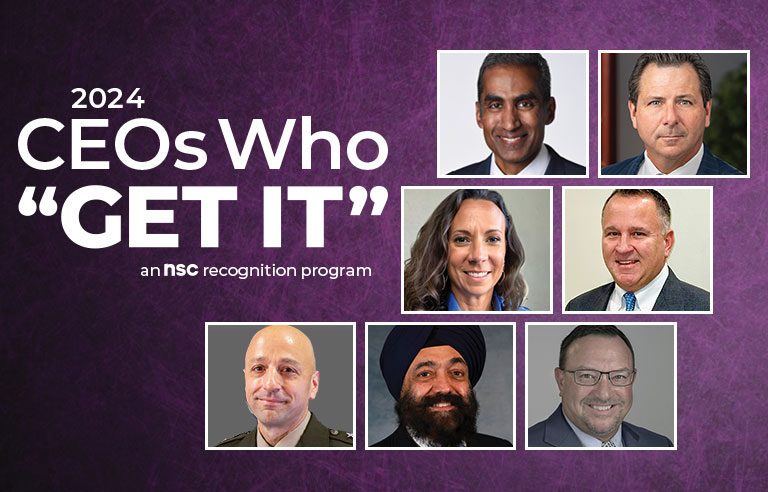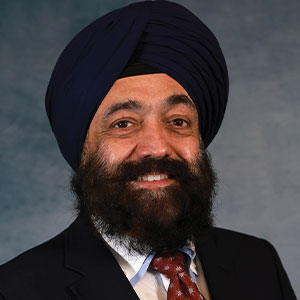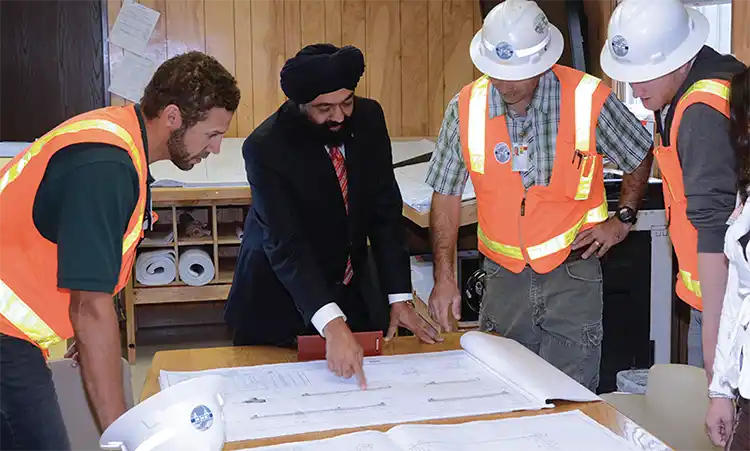2024 CEOs Who "Get It"


Manjiv S. Vohra, PE, DBIA
President and CEOECC
Burlingame, CA
Founded in 1985, ECC delivers construction, environmental remediation, contingency and disaster response, energy, munitions response, development, and fuels infrastructure solutions to solve its’ clients’ toughest challenges worldwide. ECC has successfully executed more than $13 billion in award-winning projects in 37 countries. Its professionals are in offices throughout North America, Europe, Asia/Pacific and Africa.

Describe your personal journey to becoming a CEO who “gets it.”
I have worked my entire career at ECC, joining straight from graduate school as a project engineer 36 years ago. I learned operations in environmental remediation and construction firsthand, and was very fortunate to have seasoned superintendents and safety officers who mentored me in regulations and best practices, from general housekeeping (“no trip hazards in the trailer!”), heat/cold stress and AHAs to chemical risks and transportation of hazardous waste.
A key part of safety for our projects in post-conflict areas is security. I personally led our construction and munitions program in Iraq in 2004-2005 and learned firsthand from excellent mentors the best practices and discipline required to ensure our people’s security.
When my career progressed to more senior oversight roles, I felt confident in knowing safety from the field perspective, and it allowed me to listen to and support our field staff so they could run a safe operation on every site.
Why is safety a core value at ECC?
Values are nonnegotiable and can’t be traded off with operational or financial considerations. ECC’s core value of safety states: “We value the safety, security, and wellness of our people and their families. We embrace healthy habits and behaviors. We plan and conduct our work in a manner that protects people, property and the environment.”
Our focus starts with the broader health perspective, including daily and periodic challenges that encourage healthful behaviors such as exercise, nutrition, hydration, sleep and proactive health checkups. We have an excellent mental health program that assists our employees as needed.
The “why” is very simple: We want everyone to go home safely to their loved ones each evening. And, once out of the work environment, to “take safety home” and use the principles and practices from work to safely do chores and activities in their personal lives. I’m always impressed when I see our people “do it right” outside of work, whether it’s defensive driving, properly using tools and ladders, or simply correcting others’ unsafe actions, such as tilting back on a chair in an unsafe manner.
What’s the biggest obstacle to safety at ECC?
Our clients trust us to solve tough challenges in difficult and extreme environments, such as post-disaster projects (e.g., California wildfires, Superstorm Sandy); hazardous, radiological or contaminated sites that require special safety measures to protect our workers and the public; clearing munitions and explosives of concern in civilian and post-conflict areas; or operating on remote or logistically challenging locations. Unlike industrial production, every project has a start and a finish, and typically has a newly formed team of managers, staff and subcontractors.
Job No. 1 for every project is to ensure all members are aligned on safety. We pre-screen subcontractors at the bidding stage for safety, then reinforce safety practices with selected subcontractors at the project kickoff stage. All project personnel are required to read, understand and sign off on the project health and safety plan, and we use a lot of positive reinforcement, particularly early on in each project, to help the team coalesce around safety.
We go above and beyond contractual requirements, applying for (and attaining) OSHA Voluntary Protection Program status on projects throughout the United States, from Maine to California as well as Hawaii and Guam. Programs such as the OSHA VPP help us reinforce safety procedures and identify/overcome challenges.
How do you instill a sense of safety on an ongoing basis?
Safety culture is like the air we breathe – we have to work hard to ensure it’s clean and life-affirming. We start by selecting the right employees: the ones who already have an appreciation of the critical importance of safety. More importantly, we refrain from hiring people with a dismissive attitude about safety irrespective of how well qualified they appear to be otherwise.
On this strong foundation, we engage our people on our safety culture with customized training programs, starting from Day 1. We want that safety mindset to be engrained into our everyday actions at work, home and play.
ECC’s corporate safety team is led by our director of safety and includes our executives. We collaborate on a regular basis to ensure the safety program is compliant, effective and innovative. Our executives directly communicate our safety philosophy to our people and trade partners when they visit offices and project sites.
One key aspect of our programs is that they’re meant to train, encourage and exhort – not to punish or demean. We find that this approach allows people to be creative and result-oriented in applying safety principles across many cultures and countries with a feeling of excitement and not fear. >
How does ECC measure safety?
We use industry-standard metrics (DART, OSHA recordables, etc.); they’re useful for benchmarking, but are mostly lagging indicators of performance.
We use many leading indicators: cross-functional safety audits, incident reporting, analysis (erstwhile “near misses”), safety improvement ideas (“ECCOSLIP”) and Good Catch programs. We track data via our in-house PowerBI Platform to identify trends and implement proactive programs to target areas of concern. The analysis is “live” and available to employees on our intranet on a continual basis.
There is always room for improvement because we work in many high-risk areas and in many different cultures and countries. Two key areas are selecting, onboarding and developing subcontractors, as well as improving the health and wellness of our people, with a focus on proactive and preventive actions.
We seek out improvements on a continual basis, leveraging the OSHA VPP program, in which we have participated since 2007, as well as ISO 9001, which we have participated in since 2013. We also seek feedback and benchmarking on areas of improvement from our insurance partners, as well as various surveys such as those for our Top Workplace and Military Friendly Employers designations.
What role do off-the-job safety, mental health and well-being play in ECC’s overall safety program?
ECC promotes wellness and safety as a lifestyle. A happy, healthy and productive workforce means an integrated safety approach that extends into personal wellness and addresses the whole self, with many programs extended to spouses and families. Our robust wellness programs include physical and mental health, life-work balance, wellness seminars, employee resource groups, daily communication/contests through ECC’s Sonic Boom wellness platform, and free and confidential access to mental health assistance.
We help our people grow in their chosen areas with in-house programs on mentoring, leadership development, skills training and career development. For development outside the firm, we provide tuition assistance.
One of the key stressors for mental health is financial worry. We help with a generous compensation policy. We are one of the few firms in our industry to provide premium-free full coverage health benefits for our employees and their families. We have a compassionate personal time off program where all of us can donate unused PTO to help our co-workers who may have to take extended leave.
We have been recognized in multiple locations as a Top Workplace; designated Platinum in the HIREVets program; and named a Military Friendly Employer and a Cigna Healthy Workforce firm.
Post a comment to this article
Safety+Health welcomes comments that promote respectful dialogue. Please stay on topic. Comments that contain personal attacks, profanity or abusive language – or those aggressively promoting products or services – will be removed. We reserve the right to determine which comments violate our comment policy. (Anonymous comments are welcome; merely skip the “name” field in the comment box. An email address is required but will not be included with your comment.)


